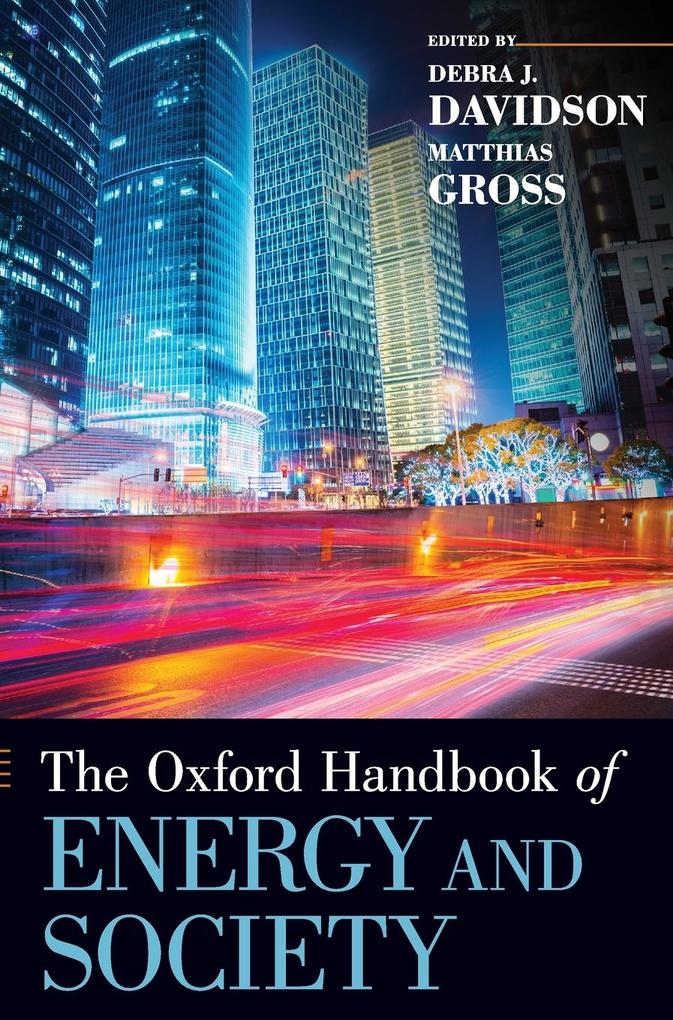
Zustellung: Mi, 30.07. - Mo, 04.08.
Versand in 2 Wochen
VersandkostenfreiThe Oxford Handbook of Energy and Society offers a collection of contemporary sociological research, highlighting the growing instability and disruptions associated with fossil-fuel-dependence, and the emerging challenges and innovations associated with a transition away from fossil fuels. Regional case studies of different energy resources from around the world are featured, as are the roles of politics, markets, technology, social movements, and consumers, all contributing to a complex systems perspective on the uncertain future of energy-society relations.
Inhaltsverzeichnis
- Part I. Energy and Society: Key Contemporary Dynamics and Theoretical Contributions
- 1. A Time of Change, a Time for Change: Energy-Society Relations in the 21st Century
- Debra J. Davidson and Matthias Gross
- 2. Energy, Climate Change, and Global Governance: The 2015 Paris Agreement in Perspective
- John Vogler
- 3. Energy Consumption as Part of Social Practices: The Alternative Approach of Practice Theory
- Ana Horta
- 4. Analyzing the Socio-Technical Transformation of Energy Systems: The Concept of 'Sustainability Transitions'
- Harald Rohracher
- Part II. Structural/Political-Economic Perspectives: The Persistent Material and Geopolitical Relevance of Fossil Fuels
- 5. National Energy Signatures: Energetics, Money, and the Structure of the Global System
- Jalel Sager
- 6. Energy Markets and Trading
- David Mares
- 7. Raw Materialism and Socioeconomic Change in the Coal Industry
- Paul S. Ciccantell and Paul K. Gellert
- 8. The International Political Economy of Eastern European Energy Security: Russia, Ukraine, and the EU
- Jack D. Sharples
- Part III. Where the Rubber Hits the Road: Consumption Dynamics
- 9. Energy Consumption Trends Across the Globe
- Richard York
- 10. Shifts in Energy Consumption Driven by Urbanization
- Perry Sadorsky
- 11. Theorizing the Behavioral Dimension of Energy Consumption: Energy Efficiency and the Value-Action Gap
- Marilyn A. Brown and Benjamin K. Sovacool
- 12. Energy Cultures as Sociomaterial Orders of Energy
- Thomas Pfister and Martin Schweighofer
- 13. The Limits of Household Change: Structural Influences over Individual Consumption
- Janet A. Lorenzen
- Part IV. Is Energy a Human Right? Perspectives on Energy Equity, and Energy Poverty
- 14. Decreasing Supplies, Increasing Risks in Oil Development
- Christine Shearer
- 15. Industrializing Countries as the New Energy Consumers
- Paulo Manduca, Mauro Berni, Iure Paiva, and José Alexandre Hage
- 16. Energy Poverty, Energy Equity in a World of High Demand and Low Supply
- Karl-Michael Brunner, Sylvia Mandl, and Harriet Thomson
- 17. Energy Poverty and Climate Change: Elements to Debate
- Marcio Giannini Pereira, Neilton Fidelis da Silva, and Marcos A. V. Freitas
- Part V. Energy and Publics
- 18. Local Responses to Renewable Energy Development
- Ana Delicado
- 19. User Innovation and Peer Assistance in Small-Scale Renewable Energy Technologies
- Sampsa Hyysalo and Jouni Juntunen
- 20. The Role of Media Influence in Shaping Public Energy Dialogues
- Aleksandra Wagner
- Part VI. Energy (Re)takes Center-Stage in Politics and Motivates Shifts in Governance
- 21. Social Movements and Energy
- Ion Bogdan Vasi
- 22. Nightmares and Dreams: Contested Framing of Unconventional Fossil Fuels
- Jennifer Dodge
- 23. Oil Opposition: Creating Friction in Energy Politics
- Mark CJ Stoddart, Jillian Rene Smith, and Paula Graham
- 24. The Local at the Forefront of Energy Transition: The Example of the Development of Renewable Electricity in Germany and Sweden
- Cyria Emelianoff
- Part VII. Emerging Trends with the Potential to Generate Significant Shifts in the Energy Society Relationship
- 25. Are We on the Cusp of a Global Renewable Energy Transition?
- Sybille Roehrkasten
- 26. Technological Optimism in Climate Mitigation: The Case of Carbon Capture and Storage
- Jennie C. Stephens and Nils Markusson
- 27. Exnovation as a Necessary Factor in Successful Energy Transitions
- Martin David
- 28. In Closing: From 'energy' to 'Energy'
- Matthias Gross and Debra J. Davidson
Mehr aus dieser Reihe
Produktdetails
Erscheinungsdatum
08. August 2018
Sprache
englisch
Seitenanzahl
600
Reihe
Oxford Handbooks
Herausgegeben von
Debra J Davidson, Matthias Gross
Verlag/Hersteller
Produktart
gebunden
Gewicht
1197 g
Größe (L/B/H)
249/183/41 mm
ISBN
9780190633851
Entdecken Sie mehr
Pressestimmen
The last section discusses emerging trends and opportunities in the energy-society relationship. The authors highlight the latest sociological research and provide their analyses on a developing and growing issue that will continue to impact society. This comprehensive volume showcases the trends, challenges, and opportunities of energy issues and their influence on society. T. Chan, MIT Libraries, Choice
Bewertungen
0 Bewertungen
Es wurden noch keine Bewertungen abgegeben. Schreiben Sie die erste Bewertung zu "Oxford Handbook of Energy and Society" und helfen Sie damit anderen bei der Kaufentscheidung.

































